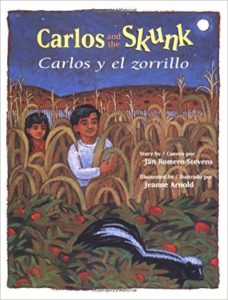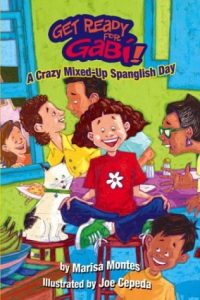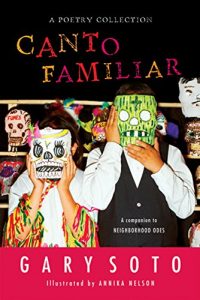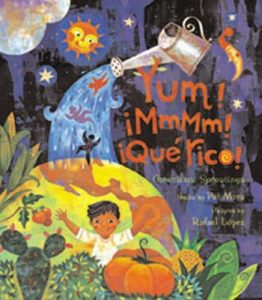 Peanuts, blueberries, corn, potatoes, tomatoes, and more-here is a luscious collection of haiku celebrating foods native to the Americas. Brimming with imagination and fun, these poems capture the tasty essence of foods that have delighted, united, and enriched our lives for centuries.
Peanuts, blueberries, corn, potatoes, tomatoes, and more-here is a luscious collection of haiku celebrating foods native to the Americas. Brimming with imagination and fun, these poems capture the tasty essence of foods that have delighted, united, and enriched our lives for centuries.
Bilingual
Carlos Y El Zorillo/ Carlos And The Skunk (Carlos Series)
In My Family / En Mi Familia
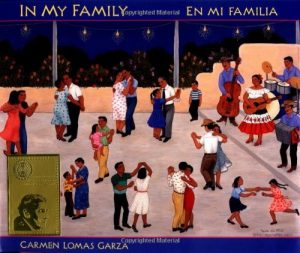 From the author of Family Pictures/Cuadros de familia comes a second book that returns readers once again to the town of Kingsville, Texas, near the border with Mexico. Through ful-color paintings and warm personal stories, Garza brings to life more loving memories of growing up in a traditional Mexican American community.
From the author of Family Pictures/Cuadros de familia comes a second book that returns readers once again to the town of Kingsville, Texas, near the border with Mexico. Through ful-color paintings and warm personal stories, Garza brings to life more loving memories of growing up in a traditional Mexican American community.
It’s Bedtime, Cucuy
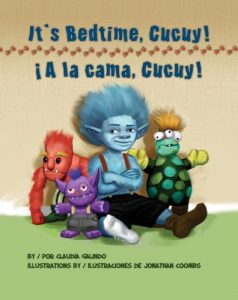 Like many human children, Cucuy, the little monster, doesn’t like to go to bed. “I’m not sleepy,” he says. “All I want to do is jump around and play!” He tries to run and hide, but Mama¡ manages to get him into his pajamas. Every night he kicks and screams, wiggles and jiggles, mumbles and grumbles. He’s hungry, he’s thirsty. He needs to go to the bathroom. But Mama¡ won’t give in. “Tomorrow you will have a whole new day to jump around and play,” she tells her little monster, until finally he… drifts… off… to… sleep.Children ages 3 to 7 will delight in the travails of poor Cucuy, the little monster who doesn’t like to go to sleep. And they might just see themselves as Cucuy protests but ultimately does fall asleep. Author Claudia Galindo and illustrator Jonathan Coombs once again collaborate on an entertaining picture book for children.
Like many human children, Cucuy, the little monster, doesn’t like to go to bed. “I’m not sleepy,” he says. “All I want to do is jump around and play!” He tries to run and hide, but Mama¡ manages to get him into his pajamas. Every night he kicks and screams, wiggles and jiggles, mumbles and grumbles. He’s hungry, he’s thirsty. He needs to go to the bathroom. But Mama¡ won’t give in. “Tomorrow you will have a whole new day to jump around and play,” she tells her little monster, until finally he… drifts… off… to… sleep.Children ages 3 to 7 will delight in the travails of poor Cucuy, the little monster who doesn’t like to go to sleep. And they might just see themselves as Cucuy protests but ultimately does fall asleep. Author Claudia Galindo and illustrator Jonathan Coombs once again collaborate on an entertaining picture book for children.
The Key To Grandpa’s House
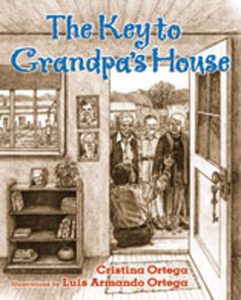 Under a smooth gray rock on the outside windowsill of a home in Chimayo, New Mexico, sits la llave–the key–to the home of Grandpa and Grandma Ortega. The key has always been there for family, friends, and neighbors to use. When Grandma Ortega passes away, some things change and some things stay the same. Grandpa now lives alone, but his life is still filled with loving family and friends and la llave is still resting underneath its rock. Cristina Ortega’s latest children’s story represents life on a northern New Mexico plaza while highlighting the respect, friendship, trust, commitment, and love found in the community. Spanish phrases within the text and detailed illustrations by Cristina’s brother, Luis Armando Ortega, combine to demonstrate to children the importance of these timeless values.Reading level: grade 4 and up
Under a smooth gray rock on the outside windowsill of a home in Chimayo, New Mexico, sits la llave–the key–to the home of Grandpa and Grandma Ortega. The key has always been there for family, friends, and neighbors to use. When Grandma Ortega passes away, some things change and some things stay the same. Grandpa now lives alone, but his life is still filled with loving family and friends and la llave is still resting underneath its rock. Cristina Ortega’s latest children’s story represents life on a northern New Mexico plaza while highlighting the respect, friendship, trust, commitment, and love found in the community. Spanish phrases within the text and detailed illustrations by Cristina’s brother, Luis Armando Ortega, combine to demonstrate to children the importance of these timeless values.Reading level: grade 4 and up
A Crazy Mixed-Up Spanglish Day
Canto Familiar
Just Like Home/Como en mi Tierra
A young girl’s first sights and experiences in the United States are sometimes familiar “just like home.”
Bebe Goes To The Beach
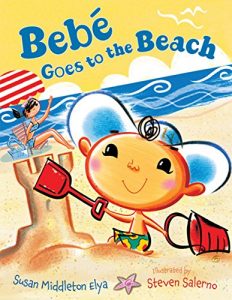 Mama leaves the shopping behind to spend a relaxing day at the beach. But sweet Bebe won’t sit still! He toddles after the waves, chases a bouncing pelota, and even surfs on a sand sculpture. When Bebé finally tuckers out, Mama gets her chance to soak up el sol. Mama and Bebe spiced things up in their first book together, Bebe Goes Shopping–and now they’re at it again! Includes a glossary of Spanish words.
Mama leaves the shopping behind to spend a relaxing day at the beach. But sweet Bebe won’t sit still! He toddles after the waves, chases a bouncing pelota, and even surfs on a sand sculpture. When Bebé finally tuckers out, Mama gets her chance to soak up el sol. Mama and Bebe spiced things up in their first book together, Bebe Goes Shopping–and now they’re at it again! Includes a glossary of Spanish words.
Brujas, Lechuzas Y Espantos / Witches, Owls And Spooks
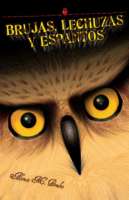
In this bilingual collection of five stories, Don Cecilio tells the neighborhood children stories that make their hair stand on end. \”In my barrio they told the story…\” and so his cuento would begin. In \”The Owl and the Bundle,\” young Tomas disappears without a trace. Distraught, his parents and siblings look for him everywhere with no luck. Upon returning home, his father sees something curious, an owl flying above the house carrying a bundle with its talons. \”Is it possible,\” he wonders, \”that the bundle is Little Tomas?\” Could the owl have taken their precious son? Based on oral tradition, these stories featuring witches, owls, and other spooky creatures have been told in Spanish-speaking barrios for generations. Now, this new edition with a first-ever English translation provided by John Pluecker will entertain and terrify a new generation of English- and Spanish-speaking children with the supernatural tales of the Hispanic community. Originally published in Spanish in 1972 as La Lechuza: Cuentos de mi barrio (The Naylor Company), Brujas, lechuzas y espantos / Witches, Owls and Spooks will fascinate children interested in scary stories and at the same time will provide a window into a different time and place, when people lived a more rural life and winged shadows flitted across the darkened countryside.

